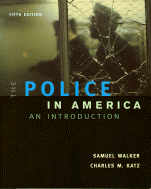

Class
Syllabi for
LEJA 506-Q1
Fall 2006
|
Class
Syllabi for Fall 2006 |
|||
Dr Kenneth Clontz |
|||
Home |
Class Information |
Link to Additional Web Sites |
E-Mail Dr. Clontz |
| POLICE: THEORY and PRACTICE | FALL 2006 LEJA 506-Q1 |
| Instructor: | Class Schedule: |
| Dr. Kenneth Clontz Office: ST-411 Telephone: 309-298-2251 |
WIU QC B-19 Sat/ Sun 10/78 - 10/8 10/28 - 10/29 12/3 - 12/4 |
| E-Mail: KA-Clontz@wiu.edu | Home Page: http://www.wiu.edu/users/mfkac |
Office Hours:
Monday
10:00 - 11:00
12:00 - 13:00
Wednesday and Friday
10:00 - 11:00
Or by appointment
More than 30 years ago, Jerome Skolnick posed the fundamental question: "For what social purpose do police exist?" Too often the answer is vague and simplistic. This web course will examine who the police are and what they do, the problems related to policing, and the many reforms and innovations that have been attempted.
The following books are mandatory reading for the course;
Walker, Samuel and Katz, Charles M. (2005). The Police in America: An Introduction (5th ed.). Boston: McGraw-Hill. ISBN 0-07-287325-6 or ISBN 0-072-94478-1. This textbook contains a PowerWeb code card that you will need for this course. Please make sure that text has a PowerWeb Registration code page inside the front cover. Please register with McGraw-Hill as soon as you get the text to make sure that the used books that the book store is selling has a registration code that is valid. Many of the used books, do not have a valid card. Buy at your own risk. You will need to be able to access the PowerWeb site!!
Kerley, Kent R. and Dantzker, M. L. Policing and Program Evaluation. Upper Saddle River, NJ: Prentice Hall. ISBN 0-13-039473-4.
Failure to have the required texts by the start of class is not an excuse for missing assignments or doing poorly on assignments. Make sure that you allow plenty of time to obtain the required books.
| Class Week | Police in America | Policing and Program Evaluation | Lecture Notes |
| 1 | Chapter 1 | Chapter 1 | |
| 1 | Chapter 2 | Chapter 2 | Week 1 |
| 1 | Chapter 3 | Week 2 | |
| 1 | Chapter 4 | Week 3 | |
| 1 | Chapter 5 | Week 4 | |
| 2 | Chapter 6 | Week 5 | |
| 2 | Chapter 7 | Chapter 3 | Week 6 |
| 2 | Chapter 8 | Chapter 4 | Week 7 |
| 2 | Chapter 9 | Chapter 5 | Week 8 |
| 2 | Chapter 10 | Chapter 6 | Week 9 |
| 3 | Chapter 11 | Chapter 7 | Week 10 |
| 3 | Chapter 12 | Chapter 8 | Week 11 |
| 3 | Chapter 13 | Chapter 9 | Week 12 |
| 3 | Chapter 14 | Chapter 10 | Week 13 |
| 3 | Chapter 15 |
Information about the class will be posted to the professor's web site (http://www.wiu.edu/users/mfkac). Students are expected to check this site and the discussion section at least twice a week.
For this course, there are five (5) position papers (two to three pages each) written during the course. Each position paper will be based on PowerWeb, outside research, related readings, and the material from the textbooks.
The requirements for the position papers will be available as a handout from Dr. Clontz's web site. No assignments or papers will be accepted after their due date. Therefore, papers faxed, placed in my mailbox, or e-mailed to me after the due date will not be accepted and will receive a grade of zero.
Students are expected to complete all papers by the scheduled times and dates. If you have any special needs, such as requiring more time to complete the papers, please notify me or contact Disability Support Services (309-298-2453) as soon as possible. You are responsible for advising me in adequate time before each assignment of any special needs that should be addressed. Failure to do so will result in you not being able to use Disability Support Services for that assignment.
No make-up or extra time on the position papers will be permitted without a written doctor's excuse or other appropriate written documentation. In the event that you must make-up a position paper, they must be completed within two weeks of the original due date. If a student fails to complete a paper during this period, a grade of zero will be given for the missed assignment. Extra-credit projects, such as book reviews or other work, are not acceptable substitutes for an undesirable grade. If a student cannot do the regularly required work in this course, what would the point be of giving them more?
The final grade for the course is based on the following:
Each position paper is worth 20% of the final grade. The grading scale for the course is given below:
| 90.0 - 100.0 = A | 70.0 - 79.9 = C |
| 80.0 - 89.9 = B | 60.0 - 69.9 = D |
| 00.0 - 59.9 = F |
It is solely the responsibility of the student to determine whether or not she or he needs to drop the course. The instructor may or may not suggest that course of action to the student, but it is the individual's obligation to make the determination of whether or not they need to take this step. "The instructor did not tell me to drop the course" is not a valid argument and will not result in a change of grade.
Western Illinois University states that "attendance is mandatory in all class sessions, including lab." A roll will be taken (at the beginning of class and after lunch) at each class meeting. Each student may sign in only him or herself. Signing the roll for another student is a violation of the academic honor code. On random days, attendance will be taken and roll called. Anyone's name that appears on the sign-up attendance roll who is not physically present in class when roll is called receives an automatic "F" for the course. Absences are counted from the first day of classes.
The expressed policy of this instructor is to allow students to miss up to 4 hours for any reason (excused or unexcused, for example: football games, university activities, sickness, court appearances, etc.). Excused absences are being in court for more than 1 week, being ill for more than 1 week, military duty that exceeds one week. When appropriately documented with written materials these days will not be counted toward the 4 allowable hours. Being sick for a couple of days, being out for University functions, going to court, etc. are the reason that this instructor allows students to miss 4 hours without penalty. IF A STUDENT MISSES 5 OR MORE HOURS FOR ANY OTHER REASONS THAN THOSE DISCUSSED ABOVE, HE OR SHE WILL RECEIVE AN "F" FOR THEIR FINAL COURSE GRADE. Students who come in after the roll has been called or passed around will be counted absent for the class. You are responsible for keeping track of your absences and your grades. Do not ask me how many absences you have. If you are already aware that you will miss more time than is permissible for any reason, including extracurricular university athletic activities, DROP THE CLASS. Arranging to make up work missed because of legitimate class absence is the responsibility of the student. Please check the student rights and responsibilities web page for information about academic dishonesty and other issues.
For the few to whom it applies, there are some basic rules for classroom behavior. Students are to refrain from talking or reading newspapers or other materials when the instructor is giving the lecture. Being late for class and walking in after the class is in session is both disruptive and rude. Students are expected to be on time. One may enter the class late, provided they explain their tardiness to the instructor after class. If a student needs to leave the class early, he or she must inform the instructor before class begins, and sit near an exit so as not to unduly disturb the class when leaving. Simply getting up and exiting class and returning during a lecture is not acceptable--this is a live lecture, not television. All portable phones and pagers are to be turned off prior to entry into the classroom. If you are required by an employer to remain on call, or there is an emergency necessitating leaving such an article activated, turn it to its silent mode of operation, if possible, and inform this instructor immediately (obviously this means before the device might go off). Otherwise, a ringing phone or beeping pager will result in the deduction of a 4 hour absence. I am certain a majority of you already know these guidelines, but recent experience has proved to me that not everyone has gotten the message on proper classroom behavior. It became necessary to formally present it in writing.
All work, including homework assignments, papers, article critiques, take home exercises, etc. are to be done on your own. Work assignments are not to be done by a group (2 or more persons), nor are answers to be copied from another. You are to receive no help from anyone except the instructor. Any violation of this policy will result in an "F" being entered as your grade for the course.
All material submitted in fulfillment of course requirements will conform to the Honor Code and to the usual academic standards governing appropriate behavior. More specifically, it is expected that all students will refrain from plagiarism and cheating. If you are caught cheating or plagiarizing, you will receive a "F" for the course. It is also held to be a violation to turn in one paper you have written to two or more different classes without all the instructors' express written permission. It is the student's responsibility to find out what is meant by plagiarism and cheating (see the Western Illinois Student Handbook). For the few that this section applies to, you will fail yourself by cheating. Please do not embarrass yourself this way. Remember, a plea of ignorance is not acceptable as a defense.
| Friday, October 20 | Last day to make a total University withdrawal without academic penalty |
Saturday, October 28 |
Last Day to drop class |
| Weeks of November 1 - 17 | Advance registration for Spring 2007 |
| Week of November 20 - 24 | Fall Break--No Classes |
|
This website
and its contents are protected under copyright law.
The following are prohibited by law: any public performance or
display, including transmission of any image over a network;
preparation of any derivative work, including the extraction, in whole
or in part, of any image; any rental, lease, or lending of the
program.
Microsoft
Front Page was used to design this site. For best viewing use a 800 x
600 32 bit True Color screen. ©
1999-2005 by Kenneth Clontz
|